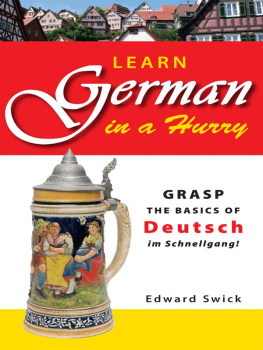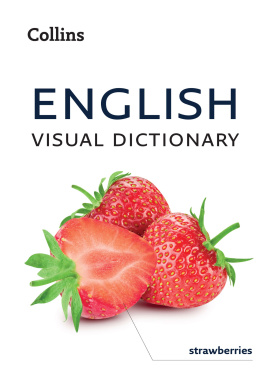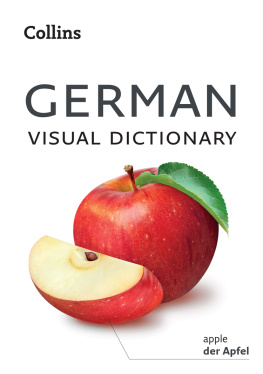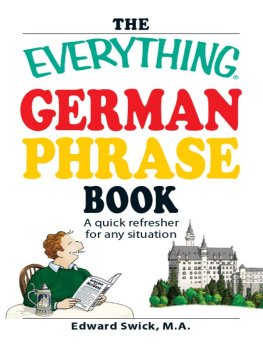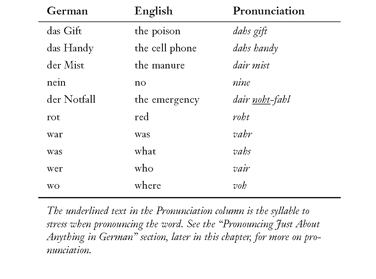Table of Contents
To my grandfather, Theo Krner.
Introduction
So youve decided you want to get familiar with the German language, or maybe brush up on some knowledge you might have forgotten. As you learn or relearn the language, know that youre in good company. More than 100 million people worldwide speak German, making it one of the most commonly used languages.
Tackling a new language can be a little scary, but it also can be exciting and fun. Sure, its challenging to push yourself to learn something new, but the results are sure to be worthwhile.
If youre worried that learning German phrases might be too much of a chore, you can relax. German and English are first cousins in the language world, sharing many words that are identical or very similar. Although German is a foreign language, youll find that its really not all that foreign.
This book teaches you a great deal of German that will help you navigate your way through a German-speaking country and converse with German-speaking people. Although you wont be exactly an expert in the language when you finish this book, you should feel confident enough to try out your new vocabulary as needed, trusting that people will understand what youre saying.
Finding time to study and practice German phrases will require a bit of a commitment on your part, but this book is set up in a way that you can pick and choose the parts of the language that are most applicable to you. If youre going to be visiting Germany, for instance, before your trip you can read the chapter containing the phrases youll need on your way there. Then, when youre on the plane, you can study the chapter that will help you check into your hotel.
So settle back and begin your journey toward learning some phrases in a new language. We think youll enjoy the trip.
Extras
Included in the chapters of this book are three kinds of sidebars, all intended to provide information youll find useful and valuable. Heres what to look for:
Watch It!
These boxes warn of potential language, social, and cultural faux pas.
Whats This?
Check these boxes for grammar tidbits and explanations of terminology with which you might not be familiar.
While Were at It
These boxes provide tips, offbeat information, and more to give you insights into the German language and culture.
Acknowledgments
The authors would like to thank the many people who provided time, information, and resources for this book. Special thanks to our editors at Alpha Books, whose keen eyes and expertise always turn out a better product than the one that was submitted. And thanks also go to Gene Brissie of James Peter Associates as well.
Thank you and much love to our families, and special thanks to Stephanie Rieffanaugh.
Special Thanks to the Technical Reviewer
The Pocket Idiots Guide to German Phrases was reviewed by an expert who double-checked the accuracy of what youll learn here, to help us ensure that this book gives you the phrases you need to know about to get around in a German-speaking country. Special thanks are extended to Jeff Poth.
Jeff Poth is a graduate of Rutgers College, New Brunswick, New Jersey, with a degree in German, economics, and art history. He graduated as a member of the German Honor Society and has studied at the University of Constance, Germany. He currently heads Poth Audio, designing and manufacturing audio components, in addition to a number of other occupations.
Trademarks
All terms mentioned in this book that are known to be or are suspected of being trademarks or service marks have been appropriately capitalized. Alpha Books and Penguin Group (USA) Inc. cannot attest to the accuracy of this information. Use of a term in this book should not be regarded as affecting the validity of any trademark or service mark.
Chapter 1
So You Want to Learn to Speak German
In This ChapterUnderstanding the similarities between German and English
Keeping your cool while learning the language
Language learning tips
Pronouncing German words and phrases
Attempting to learn a new language can be a daunting task, theres no question about it. As our world gets smaller, however, having a handle on different cultures and languages becomes increasingly important.
Although German might look and sound completely foreign to youno pun intendedyoull be surprised at the similarities found between German and English. For now, try not to think about the differences between the two languages, and lets take a look at how theyre really not all that far apart.
The Similarities Between German and English
English is a Germanic language, along with other languages such as Dutch and Yiddish. German and English are first cousins, which accounts for the great similarity of many words.
Winter, Finger, and Landwords you recognize as English wordsare also German words.
Other German words such as Mutter, Brot, and Feuer are not as obvious to translate, but when you know they mean mother, bread, and fire, they become easy to remember.
In addition, German and English have borrowed many words from other languages, particularly from Greek and Latin. Such words include Telefon, Butter, aktiv, studieren, and Theater.
Languages intertwine as new words pop up. As a result, German recently has adopted many English words, such as software, Internet, and airbag. Words used frequently in American advertising, such as fresh, cool, and happy, also have been added to the German language, along with pop-culture terms such as Hard Rock, Filmstars, and Popmusik.
All this sharing and borrowing adds up, and, at last count, more than 40 percent of all German words have English cognates.
Whats This?
Two related words in different languages are called cognates. Some English-German cognates are almost identical in spelling and meaning, whereas others are just similar.
Things arent always as they appear, however, so dont assume that all words that seem to be cognates really are. Beware of a group of words called false cognates. They seem like cognates, but they have quite different meanings. A few examples are listed in Table 1.1.
Table 1.1 False Cognate Examples



